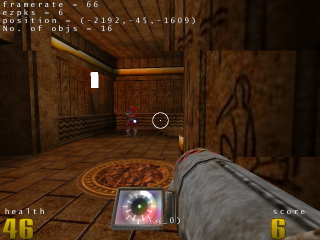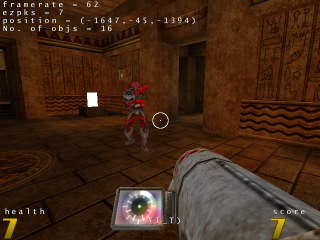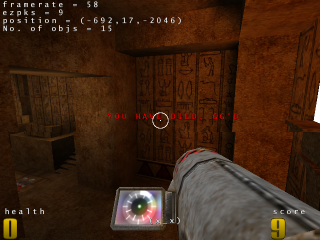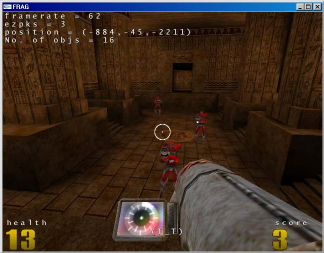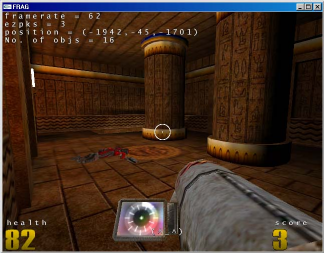Frag
Frag
Frag is a 3D first person shooting game written in Haskell, by Mun Hon Cheong. It is licensed under the GPL. The design and implementation of Frag is described in Mun's 2005 undergraduate thesis, Functional Programming and 3D Games. An AI system for Frag is described in Jayatheeban Soundararajan's 2007 undergrad thesis, also titled Functional Programming and 3D Games.
Features
- Yampa, a domain-specific embedded language for the programming of hybrid systems that using the concepts of Functional Reactive Programming (FRP) was used to program the game entities.
- The Quake 3 BSP level format, Q3Map2, and the MD3 format for models and animations are used in this game.
- Sven Panne's OpenGL binding, HOpenGL is used to render graphics.
Requirements
- GHC 8 (2017 fork) or GHC 6.8 or greater, providing HOpenGL-2.0.
- OpenGL drivers that support the vertex array and multi-texture OpenGL extensions
- Frag has portability problems. It is known to work on i386 and AMD64, and known not to work on big-endian systems.
See the blog article A Haskell eye for the windows guy for the list of requirements and how to install for Windows users.
Download
The original code can be downloaded from Hackage; it is also distributed via a Darcs repository:
darcs get http://code.haskell.org/frag
A port for GHC 8 is available: https://github.com/rainbyte/frag
Contributions
Frag needs contributions from the community! Submit pull requests to https://github.com/rainbyte/frag
Screenshots
(Note that these screenshots are of the old level, which was replaced for copyright reasons.)
BibTeX Entry
@mastersthesis{Frag,
author = {Mun Hon Cheong},
title = {Functional Programming and 3D Games},
year = {2005},
month = {November},
school = {University of New South Wales},
address = {Sydney, Australia},
abstract = {Games are commonly programmed in imperative languages.
Functional languages have been known to have benefits but have
rarely been used to program games. In this thesis we implement
a first person shooting game in Haskell and Yampa. The merits
of this approach are examined.}
}
